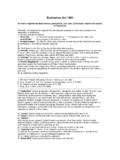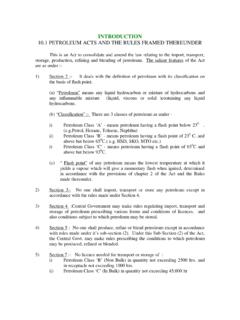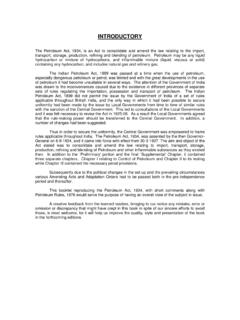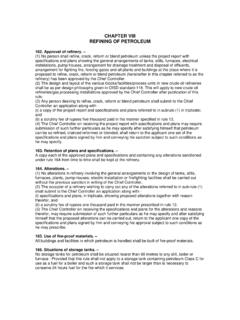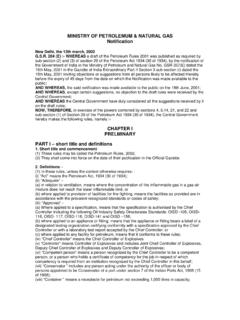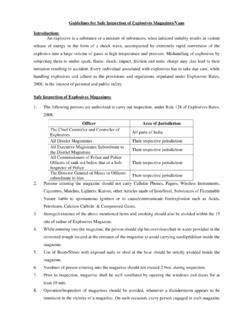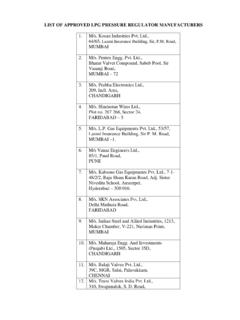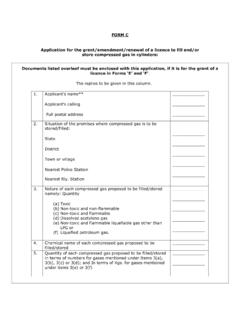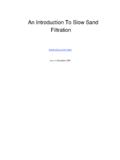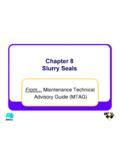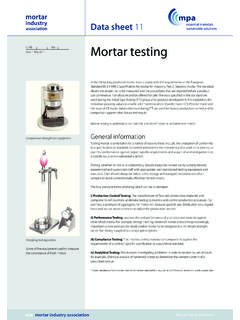Transcription of CHAPTER III TRANSPORT OF PETROLEUM PART I …
1 CHAPTER III TRANSPORT OF PETROLEUM part I General 28. Restriction on leaky receptacles. No leaky tank or container containing PETROLEUM shall be tendered for 29. Loading of containers. Barrels, drums and other containers filled with PETROLEUM shall be loaded with bung upwards. 30. Restriction on passengers, combustible and inflammable cargo. Save as provided in rules 38,39 and 52 and clause, (b) of rule 60, no ship, vessel or vehicle shall carry PETROLEUM PETROLEUM Class A or PETROLEUM Class B and Class C in bulk if it is carrying passengers or any combustible cargo other than PETROLEUM : Provided that nothing in this rule shall prohibit the use of dunnage for packing purposes in the case of coastwise TRANSPORT of PETROLEUM Class A otherwise than in bulk.
2 31. Prohibition of smoking, fires, lights. No person while engaged in loading or unloading or transporting shall smoke or carry matches, lighters or other appliances capable of producing ignition or explosion. 32. Restriction on loading and unloading by night. PETROLEUM shall not be loaded into, or unloaded from, any ship, vessel or vehicle between the hours of sunset and sunrise, (a) adequate electric lighting is provided at the place of loading or unloading and the provisions of CHAPTER IV are complied with; and (b) adequate fire-fighting facilities with personnel are kept ready at the place of loading for immediate use in the event of a fire. (2) Nothing in this rule shall apply to the refueling of an aircraft by vessels or vehicles licensed under these rules in accordance with the provisions of the Indian Aircraft Rules, 1937, or to the refueling of an aircraft by the Defence Forces of the Union.
3 Explanation - For the purposes of this rules the Chief Controller shall determine the adequacy or otherwise of the electric lighting and fire-fighting facilities. part II TRANSPORT BY WATER 33. Conditions of carriage of PETROLEUM in bulk by water. (1) PETROLEUM in bulk shall not be carried by water, except in a ship or other vessel licensed for the carriage of PETROLEUM in bulk by an officer appointed by the Central Government in this behalf (hereinafter in this part referred to as the, licensing authority) and the PETROLEUM shall be stored in such part of the ship or other vessel and in such manner as may be approved by general or special order by the licensing authority after consultation with the Chief Controller.
4 Provided that - (a) nothing in this rule shall apply to vessels registered in a country other than India importing PETROLEUM (b) PETROLEUM in tank vehicles may, with the permission, in writing, of the Chief Controller and subject to such conditions as he may specify, be transported across a river by a ferry. (2) The licence referred to in sub-rule (1) shall be granted in Form III, and shall remain in force for a period of one year from the date of its issue. 33. Requirement as to the construction of vessels. Every ship or other vessel carrying PETROLEUM in bulk, other than a ferry permitted to TRANSPORT tank vehicles under clause (b) of the provisio of sub-rule (1) of rule 33, shall be made of iron or steel well and substantially constructed with scantlings of ample dimensions in proportion to the size of the vessel:Provided that the licensing authority may, in special circumstances, allow use of such ships or other vessels constructed of materials other than iron or steel under such conditions as it may, in consultation with the Chief Controller, specify.
5 35. Tank fittings on ships or vessels. The following provisions shall apply for the TRANSPORT of PETROLEUM other than PETROLEUM Class C in ship or other vessels, namely: - (a) All tanks shall be fitted with independent approved filling and suctions pipes and valves, or with stand pipes with blank flanges, all pipes being carried down nearly to the bottom of the tanks, and no PETROLEUM in bulk shall be taken on board or discharged except through such pipes and valves, unless otherwise permitted by the Chief Controller in writing; (b) All tanks shall be fitted with manholes having screw-down cover with PETROLEUM -tight joints and, in the case of tanks intended for use with PETROLEUM class A, with ventilators or relief valves of approved pattern properly protected with wire gauge of a mesh not less than 11 meshes to linear centimeter; and (c) Ventilators similarly protected shall be fitted to all spaces, around tanks.
6 36. Self propelled barges. The following conditions shall be observed in self propelled barges transporting PETROLEUM other than PETROLEUM class C, namely: - (a) The whole of the machinery shall be at the stern of the barge and shall be entirely separated from the cargo by a cofferdam consisting of two transverse PETROLEUM -proof bulkheads separated by a space of atleast 75 centimetres; (b) each exhaust outlet from the machinery shall be fitted with an approved type of spark arrester; (c) no petrol-driven engine shall be used either as main engine or for the purpose of driving any auxiliary machinery or pumps. (d) a quick-action closing valve which can be operated from outside the machinery space, shall be fitted to each fuel feed pipe at its junctions with the fuel service tank; (e) the barge shall be provided with a heavy wood belting; and (f) suitable ventilators shall be fitted to the cargo space.
7 37. PETROLEUM in bulk on barges and flats. PETROLEUM in bulk shall not be transported in a barge or flat unless the barge or flat is self-propelled or is in tow of, or otherwise, attended by, a steamer or tug and carries: (a) at least four fire extinguishers suitable for extinguishing oil fires and a covered sand box, on deck, containing at least cubic metres of dry sand; (b) a suitable hammer of non-sparking metal; and (c) a red flag. 38. Restriction on cargo or passengers. (1) No ship or other vessel shall carry PETROLEUM in bulk if it is carrying passengers, or any inflammable cargo other than PETROLEUM or coal. (2) This rule shall not apply to PETROLEUM Class C used as fuel and carried in cellular double bottoms under engine and boiler compartments and under ordinary holds; such fuel oil tanks and installations connected therewith shall comply with the provisions of the Indian Merchant Shipping (Construction and Survey of Passenger Steamers) Rules, 1956.
8 39. PETROLEUM carried as cargo in unberthed passenger ships. PETROLEUM class A shall not be transported as cargo by an unberthed passenger ship as defined in the Merchant Shipping Act, 1958 (44 of 1958): Provided that the certifying officer referred to in section 243 of the Merchant Shipping Act, 1958 (44 of 1958), may in cases where he is satisfied that no other means of transporting the PETROLEUM are available, permit PETROLEUM Class A in quantity not exceeding 1,250 litres to be transported otherwise than in bulk by an unberthed passenger ship subject to : (a) the condition that no more persons shall be carried in the ship than can with safety be accommodated in the ship s life-boats in case of an accident.
9 And (b) such other conditions as the certifying officer may, after consultation with the Chief Controller, impose : Provided further that clause (a) of the first provisio shall not apply in the case of unberthed passenger ships engaged on voyages in the course of which they do not go beyond 32 kilometres from land. 40. Prohibition of TRANSPORT of PETROLEUM Class A by country craft. No country craft shall carry PETROLEUM class A if it is carrying passengers. 41. Restrictions on steamers or tugs employed in towing or attending a PETROLEUM vessel. (1) No steamer or tug employed in towing or otherwise attending a barge, flat or lighter carrying PETROLEUM , other than PETROLEUM class C in bulk, shall at the same time tow or otherwise attend any other vessel carrying an inflammable cargo other than PETROLEUM or coal.
10 (2) No such steamer or tug shall carry any inflammable cargo other than PETROLEUM or coal. (3) All such steamers or tugs shall be fitted with efficient spark arresters. 42. Ventilation and cleaning of holds and tanks. (1) Before any PETROLEUM is discharged from a ship or vessel, the holds of such vessels shall be thoroughly ventilated: Provided that nothing in this sub-rule shall apply to any vessel carrying PETROLEUM Class A not exceeding 30 litres or PETROLEUM Class B not exceeding 2,500 litres or PETROLEUM Class C. (2) After all PETROLEUM has been discharged from any such vessel, the holds, tanks and bilge s of the vessel shall be rendered free from inflammable vapour. (3) Sub-rule (2) shall not apply to the tanks of a ship importing PETROLEUM which leaves the port without delay after unloading of cargo or remains only for the purpose of taking on board bunkers, stores or ballast or for such other purpose as may be approved by the Conservator, if the tanks of every such ship are securely fastened down immediately after the discharge of the cargo.
